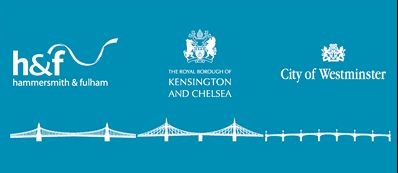 Hammersmith and Fulham, Kensington and Chelsea and Westminster council’s published their ‘lessons learned’ from the first year of their tri-borough project last month. Despite finding the report fascinating reading, I did little else with it. I’ll confess that part of that was down to jealousy! It’s an incredibly exciting project, and while it has risks, there are undoubted benefits.
Hammersmith and Fulham, Kensington and Chelsea and Westminster council’s published their ‘lessons learned’ from the first year of their tri-borough project last month. Despite finding the report fascinating reading, I did little else with it. I’ll confess that part of that was down to jealousy! It’s an incredibly exciting project, and while it has risks, there are undoubted benefits.
Reading through the report, it’s hard to not form the conclusion that an administrative merger has taken place. While politically the three councils remain separate (and legislation would be required to change that) it’s clear that at every other level they are becoming increasingly intertwined.
Three things really stuck out of the report for me.
First, was the political honesty that the tri-borough plans were not universally supported – even within the controlling groups: “there are sceptics in our majority groups about Tri-borough,” the report reads. “Their arguments have been heard and listened to. They have helped make the proposals better and many hours of public and informal discussion on these plans have taken place.” A rare public reference to the internal arguments that happen in pretty much any large organisation, but especially political organisations. Rarely do any proposals spring into life fully formed and with unanimous support. However, many ideas are greatly improved by the internal debate. That debate does, and should, remain private – otherwise it could not take place – but I think we should acknowledge it more often.
Second, and undoubtedly related, is the focus on sovereignty; but I can’t help wondering what sovereignty actually means here. There may be a 19 point ‘Sovereignty Guarantee’, but it’s very hard to imagine how any of the councils could easily extricate themselves from the tri-borough arrangements when so many of their staff will be employed jointly by two or all three of the councils. I’m sure there are examples of organisations seceding from similar partnerships, but I’m finding it hard to think of any. Indeed, such a project becomes self-fulfilling, as more and more staff are appointed jointly and, therefore, have a bigger stake in making the joint arrangements work.
Third, is the success they have had. Their first annual report makes much of the impact of ‘Summer in the City’, a joint campaign, in improving public perception of the councils. But the same can be said of any publicity campaign, much more interesting is the list of savings contained in the appendix. While I’m sure there were all sorts of political arguments when those savings were made, it’s hard to sniff at a group of councils who are running things for £33 million less by removing duplication in their services. I suspect that most residents have noticed little, if any, impact on the services they receive.
My suspicion is that few people really care that much about what happens behind the frontline. Wandsworth has a highly rated library service, for example, but I don’t think have any idea that behind it is the London Library Consortium, through whom we get and manage stock, or that we are looking at jointly running services with Croydon. What most people using a library care about are the facilities it offers and whether they can get the books they want.
There are real gains to be had in removing much of the duplication in services and realising economies of scale to free up resources for the really important stuff that happens locally and makes an area special. Civic pride comes from what happens in their areas, and doesn’t care much about where a council’s human resources or legal services are based.
But the scale of the tri-borough project is something beyond the shared services taking place everywhere else. When I have done work with various partnerships around the country I would always ask focus groups: “Do you work for the council, police (or the health service, voluntary organisation, etc.) or the partnership?” The response was always telling and revealed a lot about the culture.
It would be interesting to see how officers from those three councils respond to a similar question in a few years time.
(What finally prompted me to write something about this was that I’m taking part in an online discussion on the future of local government on the Guardian Local Government Network this afternoon between 12 noon and 2pm. Given that nothing I say can be proved or disproved I’m looking forward to speculating about flying Mayoral cars and paperless councils where we all have iPads.)
 It seems to have been an oddly quiet week.
It seems to have been an oddly quiet week.